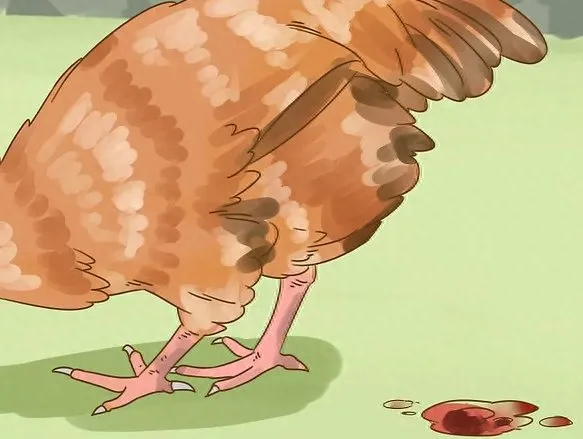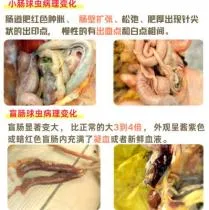Coccidiosis is a kind of parasitic disease caused by coccidia parasitism.
It mainly invade the intestinal epithelial cells of animals. It is particularly harmful to young animals.
It can cause diarrhea, blood in the stool, blocked growth and development and even death.
It is more common in animal husbandry and pet breeding.
Can you tell the difference between cecal coccidia and small intestinal coccidia?
1. Onset speed
Cecal coccidiosis has a fast onset, a short duration, and a high mortality rate.
Small intestinal coccidiosis has a slow onset, a long duration, and a low mortality rate.
2. Stool color
Cecal coccidiosis causes bloody stools. Small intestinal coccidiosis causes tomato-like or carrot-like stools.

3. Symptoms
In the early stage of cecal coccidiosis, the chickens are listless, often standing with their necks retracted and eyes closed, and their feathers are ruffled.
The chickens' feed intake decreases significantly, their water intake increases, and their crops are filled with liquid, and they have diarrhea.
There is blood in the diarrhea, and some are blood. It is also manifested in the pale mucosa, comb, and beard of the chickens. The chickens become emaciated and very afraid of cold.
The symptoms of small intestinal coccidiosis are similar to those of cecal coccidiosis, but no blood is drawn clinically.
4. Anatomical symptoms
Cecal coccidiosis. The cecum on both sides is significantly swollen and dark red in appearance. There are white spots ranging from the size of a needle tip to a millet grain and scattered small red spots on the serosal surface. The cecal mucosa is thickened, with small bleeding spots and white spots on the mucosa, and the cecal cavity is filled with fresh or coagulated dark red blood or yellow-white cheesy necrotic material.
Small intestinal coccidiosis. The intestines before and after the yolk pedicle are highly swollen or puffy, the intestinal wall is thickened, and there are many white spots and ecchymoses on it. The intestinal cavity is filled with orange-yellow mucus and cellulose blocks.

When coccidia invades quietly, the peace of the farm is torn apart-the young animals have hematochezia and diarrhea, the spirit is depressed, the growth of adult livestock and poultry is stagnant, the feed conversion rate drops sharply, the invisible oocysts multiply wildly in a humid environment, and the breeders are defeated again and again.
But now, Vitboo is coming
Vitboo is specially designed for coccidiosis. Whether it is the Eimeria tenella rampant in the chicken's cecum or the stubborn Eimeria parasites in the rabbit's intestines, it can quickly penetrate the intestinal lesions, inhibit the sporulation of oocysts, block the parasite's reproduction chain, stop bloody stools, and relieve diarrhea. The mental state can be improved within 24 hours, and the disease can be significantly controlled within 72 hours.

Vitboo uses an innovative formula that retains the powerful killing power of sulfonamide drugs while incorporating sustained-release technology to reduce intestinal irritation. It is safe for use in both young and pregnant animals.
Vitboo has proven with its strength that you no longer have to wait anxiously for coccidiosis. Choosing Vitboo means choosing to prevent every investment in breeding from being devoured by parasites, and to allow every livestock and poultry to thrive in a healthy environment - because we understand your pain of loss and our responsibility to protect you.
Phone:+86-19138056813
Tel:+86-0371-88959050
Email:info@zsybio.com
Address:Zhengzhou City, Henan Province, China